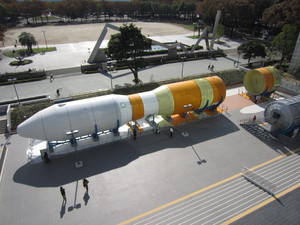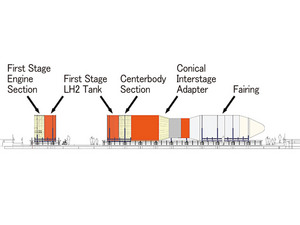Nagoya City Science Museum
TOP > Exhibition Guide > Keyword Search > Starting with "T" > the biggest rocket to have been developed in Japan > H-IIB Launch Vehicle
H-IIB Launch Vehicle



Purpose of Exhibition
The domestically produced large rocket "H-IIB" is exhibited in the outdoor exhibition space. Most of this rocket has the same structure as the real rocket and served as a test. You can find the real parts in the chart including the first stage engine section, the first stage fuel tank, the center body section, the interstage adapter and the fairing, which are exhibited in the exhibition. The rest of the parts were made by referring to the actual rocket. When the rocket "H-IIB" is launched, two other main engines and four fixed rocket boosters are attached to the rocket.
You can see the inside structure because the tank part is cut off.
For making a light but strong rocket, it is manufactured like a honeycomb. For pouring low temperature liquid-hydrogen into the tank, the exterior of the rocket is coated by a thermal material. The rocket which is exhibited is also coated by using the same thermal material. Like this, the rockets were made by using the latest manufacturing technology and design techniques. We would like you to learn the structure of rocket and feel how big it is.
Additional Knowledge
[The Composition of the "H-IIB" Rocket]
The "H-IIB (rocket)"is used for launching HTV (H-II Japanese transfer vehicle) to provide supplies to the International Space Station (ISS).It is a two-stage rocket which uses liquid fuel. The diameter of the first stage is about 5.2 meters and the entire length is 57 meters. In this exhibition, the total weight is 531 tons, the biggest rocket to have been developed in Japan. Since the same tank is used for the actual rocket as the exhibited rocket, the diameter is 5.2 meters. The entire length is about 50 meters, which is a bit shorter than the actual "H-IIB (rocket)" (46 m from the beginning to the end of the exhibit).
[The Launch of the First Rocket]
The first model of "H-IIB (rocket)"was launched at the Tanegashima Space Center on September 11, 2009. At this time, "HTV" was also the first model. Both the launch and connection of the HTV to the International Space Station had succeeded. The Japanese high-launching technology which put the rocket into the planned orbit accurately, and the connecting technology which controlled the HTV delicately and connected to the International Space Station in outer space, has been shown to the world.
[The Other Rockets Exhibition in Japan]
There are rocket exhibitions in regions where JAXA developed space technology (as of 2010).The Tanegashima Space Center is where the JAXA Research Institute is located in Tanegashima, Kagoshima Prefecture. There is a full-scale model of the rocket "H-II" in the Park. If you apply for the facility tour, you can view "H-II".The Kakuda space center by JAXA is located in Kakuda city in Miyagi Prefecture. There is the city facility which is called "Kakuda Space Center, Daiyama Park the Space Tower" and it has the full-scale model of the rocket "H-II" which was made by setting up the rocket. When you use the elevator next to it, you can go up to the observation deck while you look at the rocket.The rocket "H-II" is also displayed in the "Tsukuba EXPO Center and Wakuwaku Grandy Science Land (Tochigi prefecture)" In the Miyazaki Science Center, there is a full-scale model of the rocket "H-I". It is a small model rocket.You can learn about the sizes and the appearance by seeing the rocket exhibition which is displayed in the Public Facilities area. When the JAXA research laboratory opens to the public, you can see a real rocket. The "JAXA Tsukuba Space Center" in Tsukuba city, Ibaragi prefecture has the rear model of "H-II". "ISAS" (Sagamihara Campus Institute of Space and Astronautical Science) has the real model of "M-V". There are many companies which manufacture rockets in Nagoya. We can display the real model of a rocket thanks to the companies which contributed the rocket parts to the Nagoya city science museum. They would like you (especially citizens in Nagoya) to learn about the rocket manufacturing and development in our city.
Cooperation:Japan Aerospace Exploration AgencyMITSUBISHI HEAVY INDUSTRIES, Ltd.
Kawasaki Heavy Industries, Ltd.
Article by Masao Suzuki, curator
